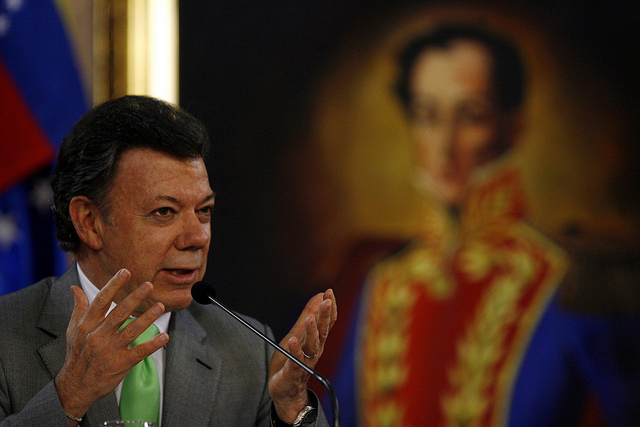In a show of his personal enthusiasm, Colombian President Juan Manuel Santos announced last Saturday June 1st, 2013 that his country would soon sign a partnership agreement with NATO, envisioning becoming the first Latin America member of the treaty. Soon after, Colombian defense minister Juan Carlos Pinzon rejected any plan for his country to seek NATO membership. Still, Colombia’s neighboring countries reacted with fury. Some called it a “provocation” and others a “threat” to the unity of Latin American and Caribbean nations. “They want to put dynamite in the heart of the achievements of the unity of Latin America, the Caribbean and South America,” said Venezuelan President Nicolas Maduro, expressing his rage alongside his Nicaraguan counterpart, President Ortega on Sunday at a public rally at the Revolutionary Square in the capital city, Managua. In solidarity, US Assistant Secretary of State, Roberta Jacobson affirmed that they support Colombia being a member of different international organizations, and that might well include NATO. Leaving the politics of Latin America behind, which is always spiced with leftist popular rhetoric, it is important to reflect, why is a NATO-Colombia partnership significant?
Colombia is the one of the few allies of NATO and Washington in Latin America. It has an important geopolitical position located at the gate of South America with access to both the Pacific Ocean and the Caribbean Sea. It is the 4th largest economy of Latin America, with an annual GDP growth rate of 4.3 on average. The country’s defense budget is about 3.6 percent of its GDP making it one of the top 20 military expenders in the world. Moreover, as a result of recent reform policies of President Santos, the country managed to institutionalize free market economy, democratic transition of power, and respect for rule of law. Yet, the country has its many problems as well. It struggles with poverty, an illegal narcotic industry, and an active guerrilla war. However, the biggest misfortune is that it shares border with authoritarian regimes such as Venezuela, which are openly hostile toward the West and Colombia, threatening the regional security and stability. In fear of hostile neighbors, Colombia seeks allies beyond Latin America, defending its security and position at the regional level. NATO could be the ally that Colombia could rely on.
Though, NATO officials denied any immediate plan for establishing a formal partnership with Colombia, they acknowledged that they are exploring the possibility of carrying out specific activities together primarily on exchange of classified information and transparency in defense. This would be a precursor for any possible future cooperation between Colombia and NATO.
NATO has its interest and responsibility toward Colombia. NATO’s political interest is the stability of the region and development of democratic institutions. As far as Colombia is concerned, they share democratic values and they face the same threats e.g. a narcotic mafia, human trafficking, and the spread of socialistic driven ideology. NATO’s military and intelligence assistance could equip Colombian forces to fight against FARC rebels and the narcotic mafia. At the same time, it will stop the spread of socialistic driven ideology in the region, which threatens NATO’s political and economic interests in the region. As this would be NATO’s first step toward a partnership in Latin America, it could open the way for other countries seeking alliance with NATO and the West. For NATO, it is an opportunity that has been a long time coming and there is little room for error.
Taken together, the argument described above underlines the importance of a NATO-Colombia partnership. Their partnership would be a result of a commitment and conformity to peace, security, rule of law and the development of democracy. As for the case of other Latin American countries, they should understand that there is no future for a policy based on the permanent exclusion of one another. It is time to accept differences and respect each other’s sovereign decision.




